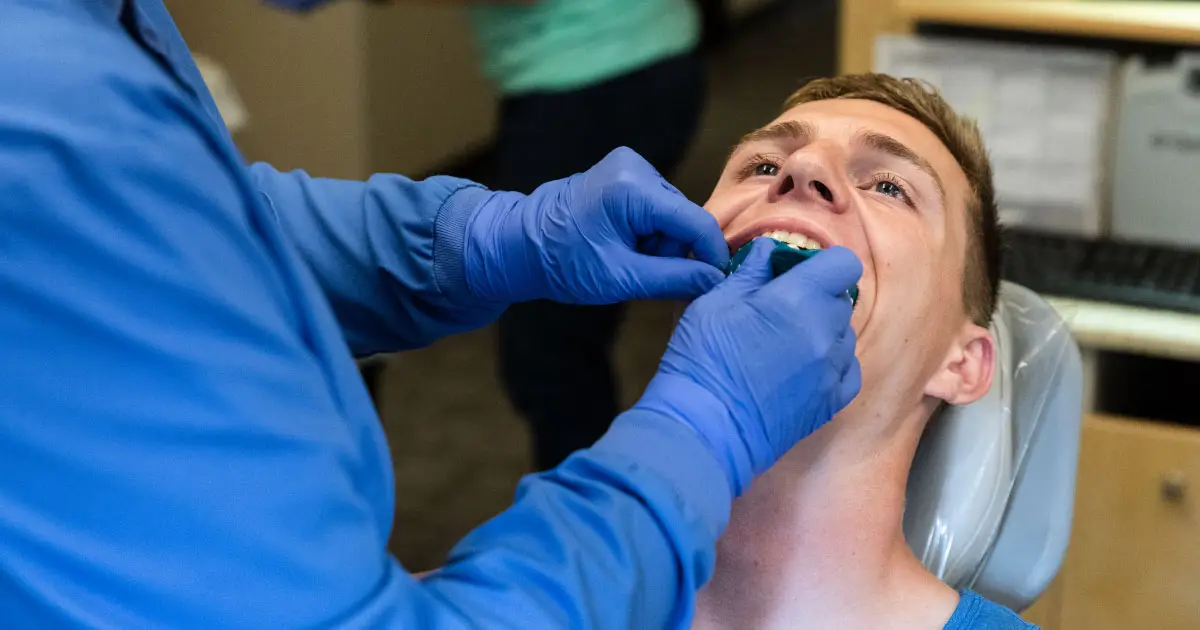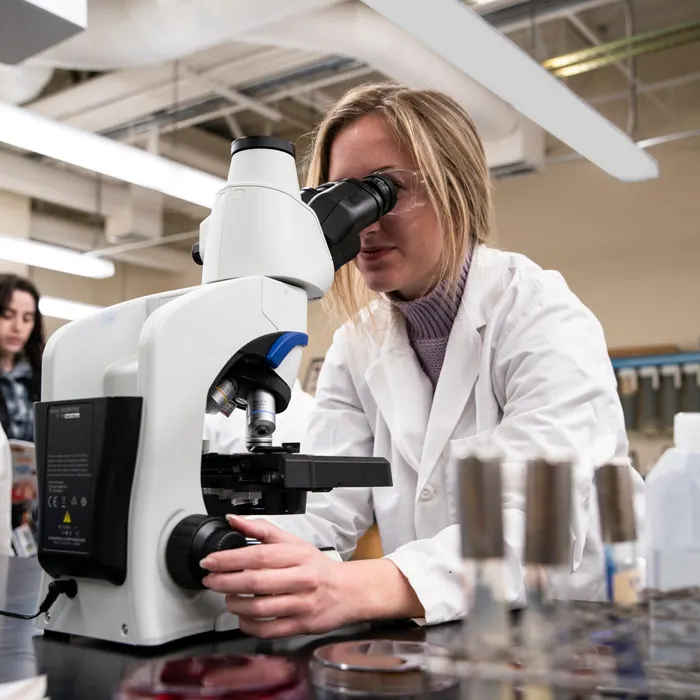
Pre-Dental Program
At A Glance
Program Type
Pre-Professional
Accreditation
Northwest Commission on Colleges and Universities (NWCCU)
Grad School Prep
An academic advisor will support you in the grad school application process
Best Major Choices
Biology or biochemistry

If dentistry is your career of choice, George Fox offers majors that meet the prerequisites to get admitted to any dental school in the region – and the majority nationwide.
You’ll most likely major in biology or biochemistry, but you can choose any academic major we offer as long as you take the specific courses required of your dental school of choice. The beauty is, you’ll have an academic advisor by your side to help chart your academic journey. You won’t go this alone!
For your part, you’ll need to meet the minimal entrance requirements to dental school, earn good grades (3.5 GPA or above), and perform well on the national Dental Admission Test (DAT), usually taken in the spring of your junior year.
As for our part, we offer undergraduate research and clinical job-shadowing opportunities. Many of our students engage in clinical research, both at the university and at Oregon Health & Science University.
In addition to offering the prerequisite courses you need to prepare you professionally, we approach science and faith as lessons that support each other, and we teach from that perspective. We are the largest Christian college in the Northwest to offer a pre-dental program.
Courses / Curriculum What Will I Study?
- Even though specific requirements differ with each dental school, the requirements generally include courses in:
- Biology (general biology, microbiology, human anatomy and physiology)
- Chemistry (general chemistry, organic chemistry and biochemistry)
- Physics (general physics)
- English (composition)
- As getting into dental school is competitive, you should choose electives that will demonstrate your knowledge and dedication to learning. Select your major based on what you enjoy and where you’ll thrive academically.
- Although you may major in any discipline, the majority of pre-dental students major in biology or biochemistry, which provide the foundational sciences required for admission to most dental schools.
- You should also focus on learning as much as you can about medicine, ethics, etc., from physicians, local hospitals, and other health professionals. Shadowing a dentist or physician can be helpful in determining whether you would really like to have a career in that profession. A significant number of these hours are expected by admissions committees to demonstrate that you clearly understand the expectations of the profession.
Cornerstone Core
The Cornerstone Core is a set of 12 courses across 10 academic disciplines that undergraduate students take at George Fox to cultivate their character within the Christian context.
As an alternative to Cornerstone Core, students can participate in our great books honors program.
Bachelors (BS) in Biology Requirements
×Biology Core Requirements (18 credit hours)
Complete the following:
Biology Upper-Division Electives (16 credit hours)
Complete at least one course from each of the following groups.
Choose one of the following:
Choose one of the following:
Choose one of the following:
Physical Sciences (16 credit hours)
Choose four of the following:
Quantitative Skills (6-8 credit hours)
Complete the following:
Choose one of the following:
Optional Thesis
Students can petition the department thesis committee by the end of the fall semester of their junior year for permission to do original research as part of their degree requirement. Students allowed to pursue the thesis option must:
- Complete an acceptable research proposal and the Research Methods course (BIOL 384) by the end of the spring semester of the junior year.
- Take up to 4 hours of Biological Research (BIOL 465) between the spring semester of their junior year and graduation, and Senior Thesis (BIOL 496) during the spring semester of their senior year.
- Complete a written thesis acceptable to the thesis committee by April 1 of their senior year.
- Prepare a poster and give an oral presentation of their research prior to graduation.
The department considers this an honor to be noted on the student's transcript. The thesis is designed to enhance a student's preparation for graduate or professional school.
Bachelors (BA) in Biology Requirements
×Core Requirements (41-45 credit hours)
Complete the following:
Choose one of the following sequences:
Sequence 1
Sequence 2
Complete the following:
Complete the following:
Complete MATH 180 or higher. Students who complete MATH 180 College Algebra are encouraged to take MATH 240 Statistics (3 credit hours) as well.
Complete the following:
Choose one of the following field studies courses:
Choose one of the following diversity courses:
Choose one of the following form/function courses:
Choose one of the following cell/molecular courses:
Upper-division BIOL electives
Liberal Arts Tracks (14-16 credit hours) - choose one
Complete the following:
Choose 12 credit hours of electives from the following:
Option 1
Complete the following:
Spanish language sequence:
Option 2
Complete the following:
Spanish language sequence:
Choose 6-8 credit hours of Global/Cultural Understanding electives from the following:
Complete the following:
Choose three of the following:
Complete the following:
Complete the following:
Introductory course taken by majors in the field (3 hours)
Take 12 upper-division elective hours, as agreed upon by department chair of chosen discipline and biology department head. (12 hours)
Bachelors (BS) in Biochemistry Requirements
×Complete the following:
Complete the following:
Complete the following:
Choose one of the following:
Choose one of the following sequences:
OR
Choose three of the following:
Philosophy: The opportunity to pursue a chemistry thesis is an honor. Consequently, the thesis option will be noted on a student's transcript. The thesis is designed to enhance a student's preparation for graduate or professional school. The heart of the thesis is original research conducted under the guidance of a chemistry faculty member.
Eligibility: The thesis option may be pursued by any chemistry major in good academic standing. Students wishing to pursue a thesis must:
- Consult with their research advisor about an acceptable research project.
- In writing, notify the chemistry thesis committee (composed of the chemistry department faculty) of their intention to conduct research. The thesis committee must receive notification by the end of the fall semester of the student's junior year.
After the beginning of the spring semester of a student's junior year, students must petition the department thesis committee for permission to pursue thesis research. Students who pursue the thesis option must:
- Enroll in at least 1 hour of Chemical Research (CHEM 465) each semester, beginning the spring semester of their junior year, through the spring semester of their senior year.
- Submit the first copy of a written thesis to the thesis committee by April 1 of their senior year. The final, edited copy is due to the thesis committee the last day of classes during the spring semester.
- Prepare a poster and give an oral presentation of their research.
In some cases, students may apply research conducted off campus to the CHEM 465 requirement. Students who participate in off-campus research programs may petition the thesis committee for special consideration of the thesis option. The thesis committee must receive the petition by the beginning of the fall semester of the student's senior year. The thesis committee may elect to substitute the off-campus experience for a portion of the CHEM 465 requirement.

Our spaces / Where Will I Learn?
Biology Labs
Learn surgical techniques in our anatomy and physiology laboratories located in the Edwards-Holman Science Center. These labs are used in our upper-division physiology classes and house three cadavers.
The department owns a $180,000 state-of-the-art Leica Manufacturing confocal microscope that provides opportunities for new research and helps uncover molecule relationships.

VR Labs
In 2021, George Fox opened its Virtual Reality (VR) Lab . In it, students interact with two programs:
- The 3D Organon VR Anatomy program is an immersive self-discovery experience into human anatomy, allowing for the manipulation of bones, muscles, vessels, organs and other anatomical structures in 3D space.
- Complete Anatomy is an advanced 3D anatomy platform that includes a detailed atlas of the entire human body, instructional videos, 3D models, virtual dissections, injury and pathology simulations, and radiology images.
The lab is equipped with 24 Vive Focus 3 virtual reality headsets with 5K resolution and 120-degree field of view. Each station includes high-end computers for additional lab work.


Ally Swanson
Dentist, Grants Pass, Oregon
My time at George Fox prepared me very well for dental school. I was consistently challenged and supported by my professors when I expressed my desire to pursue dentistry.
Request Information About Pre-Dental
